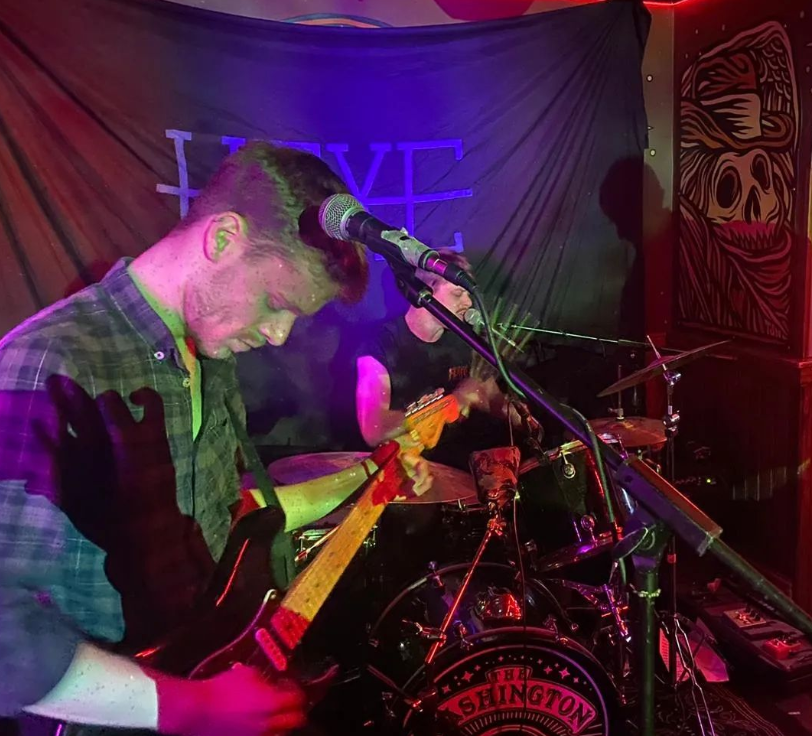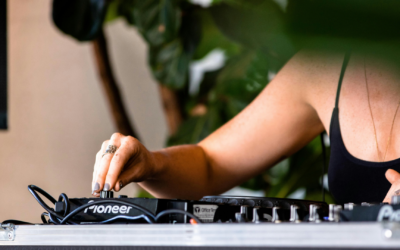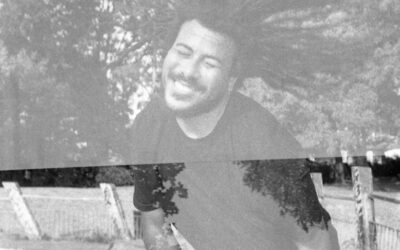Time, money and resources are all common barriers small artists face when considering recording an album. Whilst these are all more than valid concerns, there are many benefits to recording albums without a record label, in the early stages of a music career. Hexe band have just released their debut self-titled album making them more than qualified to speak on the subject. Meet Isaac, drummer and lead vocalist for Hexe, as he talked Feedback through the benefits of recording an album as an up and coming artist.
Hexe consists of Isaac, guitarist Reuben and Isaac’s dad Paul, on the bass. For the three-piece South Yorkshire band, recording an album had been in the works for years. Isaac explained: “It is more of an organic process really. I’m sure Reuben and myself will sometimes sit down and write a few lyrics or make a riff but seventy / eighty percent of song writing would just be us jamming and letting it evolve naturally.
“We formed the band, me, Reuben and another lad from our school, in 2014 and songs which we performed in our very early gigs are on that album. So it has taken us about ten years to do it. However, to record it, I don’t think that is really the case. It has taken us ten years but I’m sure in actual work time it is probably two years of work.”
For Hexe, releasing an album was about more than just showing people their passion and creativity, although this was undoubtedly a massive part of it. Having more music up on your streaming platform increases the likelihood of listener retention. Isaac said: “When we had one track up, you can’t expect people to listen to it all the time. It is one track, they’ll get bored of it.
“If you’ve got a good range of songs and someone is dropping onto your platform and they are going to listen to a couple of them. The more songs you have on there, the more likely they are to find one which they are going to like.”
The grunge style music on the album saw Hexe achieve increased engagement levels in the weeks that followed the album release, including a spike in monthly listeners and a sold out album launch party at a one hundred capacity venue. High gig attendance has become a regular pattern throughout Hexe’s time playing together. Isaac said: “Considering we have about 180 followers, probably a bit less, there aren’t that many small bands that can say that 50% or more of their followers will come to their gigs.”

But maintaining this engagement online has been a lot harder than in person. Isaac recommends releasing an album a little bit at a time, maybe a track every six weeks to maintain a steady flow of engagement. He explained that Hexe saw their monthly listening spike to around 700 and then die down as a result of not posting following the album release. Isaac said: “I’m not a fan of having to play an algorithm to get our monthly listeners up.”
And so, if executed right, there are clear benefits to releasing an album as an up and coming artist. But this doesn’t solve the issue most artists have, where the drive and determination is there but the money and resources are lacking. It is an issue that Isaac and his band also had to battle through, recording ten out of thirteen songs in Paul’s attic and exploiting as many financial loopholes as possible with just one of the tracks being recorded under paid studio time. “After going to the studio we realised that there is this pressure to nail it and get it right. Our music is not particularly nailed down in terms of the way it is made so we accept that there’s going to be changes to what we want to sing or do.
“The other ten songs were just sort of like projects. We wanted to get a full album out and record these ten more songs. These were done entirely in my dad’s attic.”
Hexe’s grunge sound lends itself to more loose and more raw recordings, more similar to how they would play live. He recognised this as a huge part of how recording in the attic suited the group. “It is quite a dirty album, it is not like its clean cut. We like it rough in terms of the sound. We wanted it as it sounds when we play on stage. We are quite loose when it comes to how we perform, we like the rough edges.
“There’s plenty of fuck ups in there which we think adds character. It doesn’t suit everyone’s sound, if you need a clean crisp sound, you probably couldn’t get away with what we did (recording outside of a studio).”
Two of the tracks were recorded at Reuben’s old music college studio, and the whole album was produced with his knowledge of recording and equipment. Get yourself someone like Reuben. That definitely helps.
Isaac recognised the financial barriers involved and advised: “See how many days you think it would take to record it in a studio but whatever you think, add two hours on for setting up. Compare that to buying your own gear and doing the elements of it yourself. See where you can best apply the money.”
He also stressed the importance of having a set release date, the potential to be picked up on a release radar on Spotify could be huge for your band. You can find out more about Hexe here and listen to the album below. Feedback recommends top track Frogman which features Dick Valentine from Electric six.









